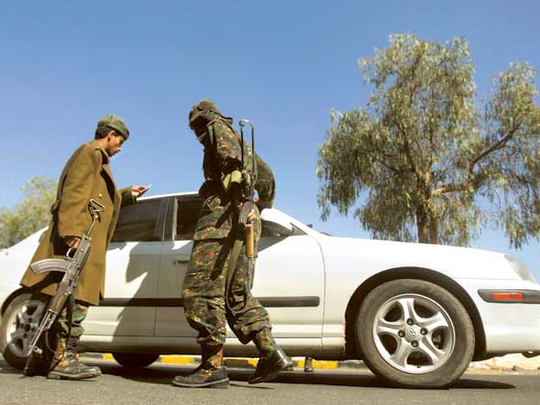
Sana’a: The death toll from the army shelling of funeral tents on Saturday in South Yemen has risen to 20. A witness in the city of Dhalae told Gulf News that the shells hit a gathering of men and children paying condolences to the family of a secessionist protester who died in a clash with the government forces.
37 civilians were also injured, many were in critical condition.
Local security officials said that a tank accidentally targeted the tent when it was trying to respond to gunfire by armed secessionists.
“This is not true. The tank that was parking outside government compound intentionally and struck the funeral gathering with six shells.” the witness said.
In a statement, the supreme council of the Southern Movement headed by prominent activist Hassan Baoum, said: “The horrific massacre that the Yemeni occupation regime has committed ... affirms the need for the people of the south to take up arms in face of the genocide it is committing against” them.
Shortly after the deadly shelling, angry protesters took to the streets of the troubled southern provinces, blocking roads and attacking security offices.
Local activists said that army forces used live bullets to disperse a protest, killing three and injuring many others in the city of Dhalae. Secessionists leaders subsequently drummed up supporters for a meeting in the city on Saturday afternoon to consider how to respond to the army shelling.
The incident promoted the country’s Supreme Security Committee into forming an inquiry committee to investigate the causes of this event. The small committee which is formed from senior security officials has been asked to bring [the incident’s] findings immediately.
After British colonial rule ended in 1967, Southern Yemen was independent until union with the north in 1990. A secession attempt four years later sparked a brief but bloody civil war that ended with northern forces taking over the south.
A long-running dispute over whether and how to grant the south limited independence has delayed the political transition following the 33-year rule of Ali Abdullah Saleh, who stepped down last year after Arab Spring-inspired protests.
In the south eastern Hadramout province, Hadramout Tribal Alliance denied attacking a major pipeline that carries oil production from Masila oilfield to Al Dhaba port in the town of Shaher.
Unknown assailants planted an explosive device under a pipeline about 5km from Al Dhaba port on Saturday morning, causing minor damages.
A senior employee from the port told Gulf News that his boss briefed them on Saturday morning about the attack.
“We were told that someone attacked the pipeline at midnight. The port halted pumping operations from fields to oil storage tanks as a precautionary measure,” the employee said, asking not to mention his name as he is not allowed to speak to reporters.
Sold Al Shinini, the spokesman of the Alliance, told Gulf News on phone that his tribesmen did not attack the pipeline.
He said: “Attacking pipelines are not among our characters. The pipeline was bombed by rings of pillage and looting in Sana’a and pinned it on the Alliance in order to create rationale for attacking us.”
Masila oil pipeline in Hadramout has long been untouched by regular attacks on the country’s main oil and gas infrastructure.
Most of attacks occur in the lawless provinces of Shabwa and Mareb where disgruntled tribesmen blow up the pipelines to force central government to release jailed relatives. Hadrmaout Tribal Alliance was created after the death of a prominent tribal leader in the same province earlier this month.
The alliance is composed of big tribes and wants to take charge of security in the large province, which includes substitution of north-run oil protection forces with local people.
Also in the same province, at least two alleged Al Qaida fighters were killed on Friday, security official told Gulf News. The two targets were travelling in a truck on the outskirt of a small town situated in the middle of a highway between Seiyun and Shibam.
“The air strike burnt the bodies of the two men who were carried to Shibam hospital. The strike occurred at 5.15pm near an oil station,” said the official on condition of anonymity because of the sensitivity of the issue.
US drones have carried many deadly attacks, killing tens of suspected Al Qaida militants in the growing unstable province since the beginning of this year.












